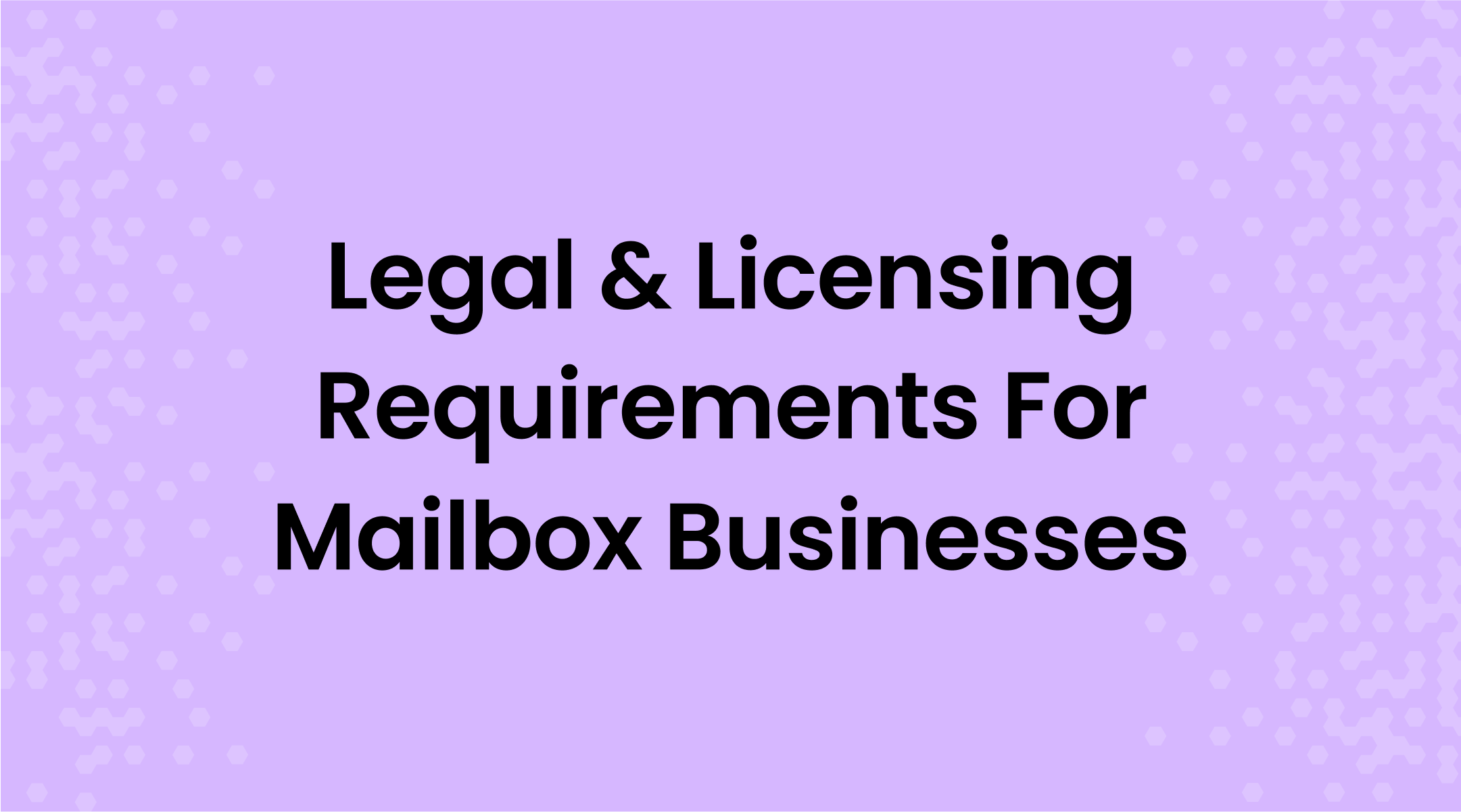Legal & Licensing Requirements for Mailbox Businesses

The profitability of a mailbox business is built on compliance. Failing to meet legal and licensing requirements, particularly those set by the USPS, can result in heavy fines, suspension of mail delivery, and a quick end to your venture. This guide provides the essential legal blueprint for launching and operating a compliant mailbox store business.
The Federal Framework: USPS Regulations
The most critical legal hurdle for any mailbox business, known legally as a Commercial Mail Receiving Agency (CMRA), is compliance with the U.S. Postal Service (USPS) regulations outlined in the Domestic Mail Manual (DMM).
The Cornerstone: PS Form 1583
Federal law requires all CMRAs to verify the identity of their customers before accepting mail or parcel delivery (39 CFR § 111.1). PS Form 1583, Application for Delivery of Mail Through Agent, is the document that fulfills this legal requirement and creates an official authorization record.
- What it requires: For every customer (individual or business) opening a mailbox, you must obtain a notarized PS Form 1583.
- Customer Identification: The customer must present two forms of ID during notarization:
- A Government-issued photo ID (e.g., valid driver's license, passport, or U.S. permanent resident card).
- A secondary ID verifying the home address (e.g., current lease, mortgage, voter registration, or vehicle insurance policy).
- CMRA Owner Requirements: The CMRA owner must also apply to the USPS by submitting PS Form 1583-A to operate as a CMRA and must present acceptable identification to the Post Office for review.

Platform Integration for Compliance: The USPS requires CMRAs to enter the data from every PS Form 1583 and upload copies of the supporting documents into the Postal Service's electronic CMRA Customer Registration Database. This process is mandatory. By using digital mailroom management software, you can simplify the initial capture and secure storage of these sensitive documents, ensuring a compliant record is maintained for every customer. This process becomes unmanageable with paper records as your customer base grows.
Business Structure & Financial Compliance
Before you worry about mail, you need a legally sound business. Choosing the right entity protects your personal assets from business liabilities.
Choosing Your Business Entity

The LLC structure is the most popular choice for mailbox businesses, balancing strong liability protection with relatively straightforward tax and administrative requirements.
Essential Federal & State Identifiers
- Employer Identification Number (EIN): A free number issued by the IRS that acts as your business's Social Security number. It is required for opening a business bank account, hiring employees, and filing federal taxes.
- Business Bank Account: It's critical to keep personal and business finances separate to maintain the integrity of your LLC (known as "piercing the corporate veil"). This protects your personal assets.
State & Local Licensing and Services
Beyond federal rules, you must comply with state, county, and municipal requirements that govern business operations.
State and Local Permits
- General Business License: Almost every state and municipality requires a general business license to operate. This often involves paying a small annual or biannual fee.
- Zoning & Occupancy Permits: Before signing a lease, confirm that your location's zoning permits a "commercial mail receiving agency" or similar retail service use. A Certificate of Occupancy is required to demonstrate that the building is safe and legally habitable for commercial use.
- Fictitious Name / DBA: If your business operates under a name different from your legal entity name (e.g., your LLC is "XYZ Holdings LLC" but your store is "The Mail Stop"), you must register a "Doing Business As" (DBA) or fictitious name with your state or county.
Notary Public Licensing
Becoming a Notary Public is a high-value, low-cost service to offer your customers (and is necessary for completing PS Form 1583 for new customers).
- Process: Requirements vary by state, but generally include:
- Completing an approved education course.
- Passing an exam (required in states like New York).
- Submitting an application and fee (e.g., New York State's initial application fee is $60).
- Purchasing a surety bond (a type of insurance) and a notary stamp.
- Profit Potential: State laws set maximum fees for notary acts. For example, states like California and Arizona allow a fee of $10 to $15 per signature, turning this compliance step into a significant revenue stream.
Mitigating Liability and Risk
Given that a mailbox store handles sensitive documents and valuable packages, specific protections are necessary.
Fidelity Bonds
A Fidelity Bond (or Employee Dishonesty Insurance) is essential for a business handling client mail, checks, and sensitive data. This is a type of business insurance that protects you from financial losses resulting from the dishonest acts of your employees, such as theft, forgery, or embezzlement.
While often not legally mandated, being bonded:
- Protects your business from internal theft.
- Builds trust with customers, demonstrating financial responsibility.
Mandatory Record Keeping
USPS regulations require meticulous record-keeping:
- PS Form 1583: Must be kept on file for at least six months after a customer closes their mailbox [Source: Federal Register].
- Quarterly Certification: CMRA owners must certify to the USPS that the data in the CMRA Customer Registration Database is current every quarter (Jan 15, Apr 15, Jul 15, Oct 15).

Modern Solution’s Role in Liability: A system like Parcel Tracker protects from liability by creating an unbreakable digital chain of custody. When a package arrives, it's scanned and logged in the system. When the customer picks it up, they sign digitally, and some systems even require a photo ID check or a photo capture of the package at the time of pickup. This digital trail provides irrefutable evidence of the transaction, which is critical in the event of a customer dispute over a missing package.
Launching Your Mailbox Store with Confidence
The legal and licensing process for a mailbox business is highly structured, primarily because the USPS treats it as an agent for mail delivery. The most critical takeaway is the meticulous management of PS Form 1583 and the subsequent digital data entry into the CMRA Customer Registration Database.
View this process not as a hurdle, but as a commitment to professionalism. Invest in the correct legal structure, and leverage modern mailroom and parcel management software like Parcel Tracker to ensure compliance, protect your assets, and provide customers with the secure, trustworthy service that defines a successful mailbox store business.




.png)

